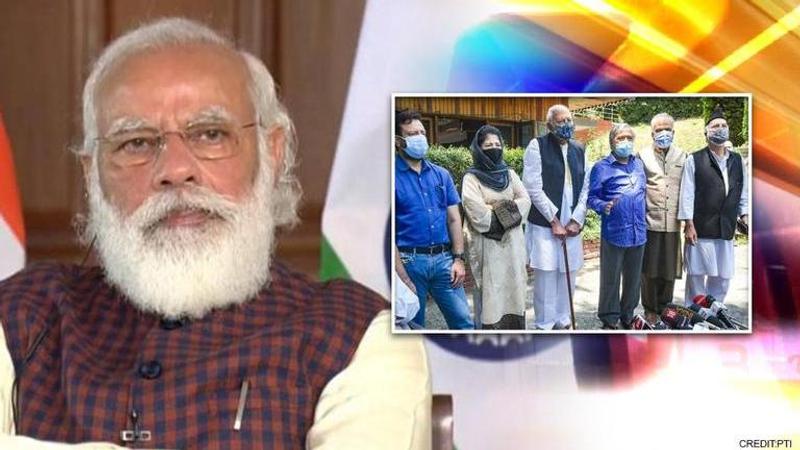Published 12:33 IST, June 24th 2021
PM Modi to hold meet with J&K leaders since abrogation of Article 370: Major takeaways
PM Modi is meeting an all-party delegation of leaders from Jammu & Kashmir to deliberate on roadmap for the restoration of Statehood to the union territory.

Prime Minister Narendra Modi is meeting an all-party delegation of leaders from Jammu and Kashmir to deliberate on the final roadmap for the restoration of Statehood to the union territory that was carved out from the erstwhile State, following the abrogation of Article 370. The meeting comes two days after the BJP marked the death anniversary of Jan Sangh founder Shyama Prasad Mukherjee, whom the party and the extended RSS family consider the first martyr in the cause of integration of the Muslim-majority state with India.
While this might be incidental, it explains the ideological moorings of the August 5, 2019 move of the Modi government. The RSS, BJP, and its erstwhile avatar Jan Sangh historically believed Article 370 to be an impediment in the complete integration of the State with India. Having removed it from the Statutes, and brought in many other enabling legislations, the Modi government can claim to have capped one of the troikas of what constituted the core agenda of the RSS family. Ram Temple (decks cleared and under construction) and Uniform Civil Code (UCC) being the other two.
Since it was never going to be easy – not just Kashmir-based parties, but even Congress has been opposed to the move – and anticipating trouble from across the border, the government had imposed a strict clampdown on the valley. Thousands of Kashmiri leaders were put under arrest, including the entire top leadership of mainstream parties like the National Conference, PDP, and PC among others. Harsh measures had to be put in place to make sure there was no trouble as it could have had global repercussions. Parallelly, the entire separatist leadership under Hurriyat was made redundant with a massive crackdown and anti-corruption measures.
The pictures of National Security Advisor (NSA) Ajit Doval taking rounds of parts of the valley and mingling with commoners was part of the plan to tell the world Kashmir was calm and in India was in control. Over a period of time, well-thought measures were taken to restore normalcy, including a massive logistics operation to make sure essential supplies were not affected. Center-backed NAFED bought the highest tonnage of apples from the valley in 2020.
The most important aspect of restoring normalcy was the holding of local bodies' elections, both at village and city levels. Another feather in the cap of the center was the holding of block-level elections, thus creating a new tier of democracy in the State. As of today, thousands of panchayat, block, and district-level leaders are present in the valley, who have been adequately empowered to work for the development of their respective jurisdictions.
Kashmir is today by and large peaceful, weekly Friday stone-pelting has not been heard for over a year, separatists have become irrelevant, and but for occasional terror incidents orchestrated to keep the pot on the boil, the valley can look towards a better future. The restoration of Statehood to Jammu and Kashmir has to be seen in the light of these progressive moves towards normalcy. The step has been a public commitment made both by the Prime Minister from the ramparts of Red Fort, and Home Minister Amit Shah, who promised it on the floor of Lok Sabha while introducing the Jammu and Kashmir Reorganization Act itself. Part 5 of the Act calls for delimitation to happen before elections are held. Delimitation exercise is also going to pan out nationally as per the Delimitation Act of 2002 (the reason why a new parliament building is being made to accommodate more members).
Parallel developments, both along the borders and globally have also nudged the Modi government to move in this direction. The standoff with China, the thaw with Pakistan, coming of a Democrat administration in America have all played their role. While the Modi government would have liked coming up of a new leadership, failure of attempts to achieve that has brought focus back on the old guard over the last six months. Hence the re-engagement with Mufti and Abdullahs and others. The invite list includes three leaders each from the BJP and Congress, apart from both Omar and Farooq Abdulla, Mehbooba Mufti, Sajjad Lone, Altaf Bukhari, Bhim Singh, and MY Tarigami.
It would be interesting to see how the Modi government engages with them. By accepting the invite and trooping down to Delhi, the valley leadership has shown a welcome flexibility. Remember this is the same Farooq Abdulla who had sought China’s help in restoring Kashmir’s special status. Talks are welcome.
Updated 12:33 IST, June 24th 2021




